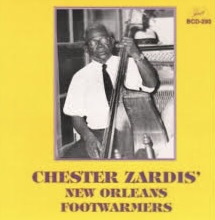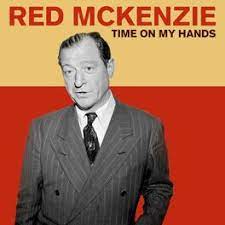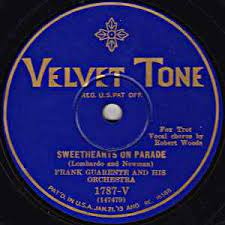
Daily Dose Of Jazz…
Chester Zardis was born on May 27, 1900, in New Orleans, Louisiana and played bass from a young age, studying without his disapproving mother’s knowledge under Billy Marrero of the Superior Orchestra. In his teens he was sent to the Jones Waif Home where he began playing with another of the Home’s residents, Louis Armstrong.
He joined Buddy Petit’s orchestra at age 16, and worked as a bassist in nightclubs and a tubist in brass bands in 1920s New Orleans. There he played with Kid Rena, A.J. Piron, Punch Miller, Kid Howard, Jack Carey, Fate Marable, and Duke Dejan’s Dixie Rhythm Band.
He was given the nickname “Little Bear” by riverboat bandleader Fats Pichon, a bandleader with whom Zardis played in the 1930s. During that decade he also played with Count Basie in New York City, and recorded with George Lewis and Bunk Johnson. During World War II he served in the Army, then worked briefly as a sheriff. Upon his return to New Orleans, he played with Andy Anderson, but quit music between 1954 and 1964.
When he returned to active performance, Chester played often at Preservation Hall with Lewis and Percy Humphrey among many others. He continued to be a fixture of the New Orleans jazz scene up until his death in 1990, including several international tours.
Double bassist Chester Zardis, who was regularly featured in documentaries including Liberty Street Blues, Chester Zardis: Spirit of New Orleans, and Three Men of Jazz, died on August 14, 1990 in New Orleans.
More Posts: bass,history,instrumental,music

Daily Dose Of Jazz…
Vic Berton was born Victor Cohen on May 7, 1896 in Chicago, Illinois. His father was a violinist who began his son on string instruments around age five. He was hired as a percussionist at the Alhambra Theater in Milwaukee, Wisconsin in 1903 when he was only seven years old. By 16, he was playing with the Milwaukee Symphony Orchestra and the Chicago Symphony Orchestra. While serving in World War I he played drums for John Philip Sousa’s Navy band.
In the early 1920s, Berton played in the Chicago bands of Art Kahn, Paul Beise, and Arnold Johnson. He led his own ensemble which played at the Merry Gardens club. 1924 saw him become the manager of The Wolverines, and occasionally played alongside Bix Beiderbecke in the ensemble. Later in the decade, he played with Roger Wolfe Kahn, Don Voorhees, Red Nichols and Paul Whiteman. He worked extensively as a session musicianbefore moving to Los Angeles, California in 1927.
During his time in Los Angeles he played with Abe Lyman and recorded in studios for film soundtracks. Vic served as director of Paramount Films’s music division for a period and worked in the Los Angeles Philharmonic Orchestra. In the 1940s, he worked as a percussionist in the studios for 20th Century Fox.
Drummer Vic Berton died on December 26, 1951 in Hollywood, California from lung cancer.
More Posts: bandleader,drums,history,instrumental,jazz,music

Daily Dose Of Jazz…
Minor Hall was born in Sellers, Louisiana on March 2, 1897 and was the younger brother of Tubby Hall. He studied at New Orleans University until 1914, then began playing with Kid Ory in the middle of the decade. He played in various New Orleans ensembles, including the Superior Band, then moved to Chicago, Illinois in 1918. He briefly took his brother’s spot in Lawrence Duhe’s band before serving in the U.S. Army during World War I. By the time he returned, King Oliver was leading Duhe’s band, which Hall rejoined in 1921.
In 1926 he played with Jimmie Noone, then moved to California for an extended run with Mutt Carey’s Jeffersonians from 1927 to 1932. He played in the Winslow Allen Band during the Thirties, but took a hiatus from music for part of the decade. He served briefly in the Army again in 1942.
In 1945 he rejoined Ory in his Creole Jazz Band, becoming one of his most long standing members. He remained with Ory’s ensemble until 1956, when he retired on account of poor health, having never led his own recording date, though he recorded extensively with Ory and with Louis Armstrong in the 1940s.
Drummer Minor Hall, better known as Ram Hall, died in Sawtelle, California at the age of 61 on October 16, 1959.
More Posts: drums,history,instrumental,jazz,music

Daily Dose Of Jazz…
William ‘Red’ McKenzie was born on October 14, 1899 in St. Louis, Missouri. In 1923, he founded the Mound City Blue Blowers with Jack Bland and Dick Slevin. Later they were joined by guitarist Eddie Lang. The quartet also used the name Red McKenzie and the Candy Kids.
In 1929, the Blue Blowers recorded the songs One Hour and Hello Lola with Glenn Miller, Pee Wee Russell and Coleman Hawkins. They also recorded with Bunny Berigan, Jimmy Dorsey, and Muggsy Spanier. McKenzie sang with the Paul Whiteman orchestra and in the 1930s led the Spirits of Rhythm and the Farley-Riley band.
In 1931, he sang on Time on My Hands, Just Friends, and I’m Sorry Dear. McKenzie played in the Town Hall concerts of Eddie Condon, but retired in the 1940s.
On February 7, 1948 jazz vocalist and musician Red McKenzie, who played a comb-and-paper as an instrument, transitioned in New York City.
More Posts: comb & paper,history,instrumental,jazz,music,vocal

Daily Dose Of Jazz…
Frank Guarente was born Francisco Saverio Guarente on October 5, 1893 in Montemiletto, Italy and received formal training in music before emigrating to America in 1910. He settled in Allentown, Pennsylvania, where a brother of his lived.
Relocating to New Orleans, Louisiana in 1914, where he took a job in a bank and associated with ethnically Italian musicians such as Nick LaRocca and Tony Parenti. He met King Oliver and eventually started getting gigs with New Orleans brass bands. He played at Tom Anderson’s club and toured Texas under the name Ragtime Frank with his ensemble, the Alabama Five.
Serving in the United States Army during World War I in 1917, then played in Philadelphia, Pennsylvania with Charlie Kerr and Eddie Lang. Putting together his own group in 1921 in New York City, which included Arthur Schutt and Chauncey Morehouse. Soon after, Paul Specht picked his players up to join a larger orchestra, and Guarente played with Specht on European tours through 1924.
Leading a Specht side group called The Georgians, they recorded between 1922 and 1924 in the style of the Original Dixieland Jass Band. He left Specht in 1924, to form his own group, The New Georgians, that toured Europe and remained active until 1927. This he followed by working in England with the Savoy Orpheans and ensembles associated with Bert Firman.
Returning to the United States in 1928, he joined Specht’s orchestra again, playing until 1930. He joined Victor Young’s band in 1930, remaining there until 1936, and also played with Jimmy Dorsey, Tommy Dorsey, Jack Teagarden, Bing Crosby, and The Boswell Sisters on record and radio. In 1937 ill health forced him to stop performing and on July 21, 1942 in New York City, trumpeter, composer and bandleader Frank Guarente transitioned at the age of 48.
More Posts: history,instrumental,jazz,music,trumpet




